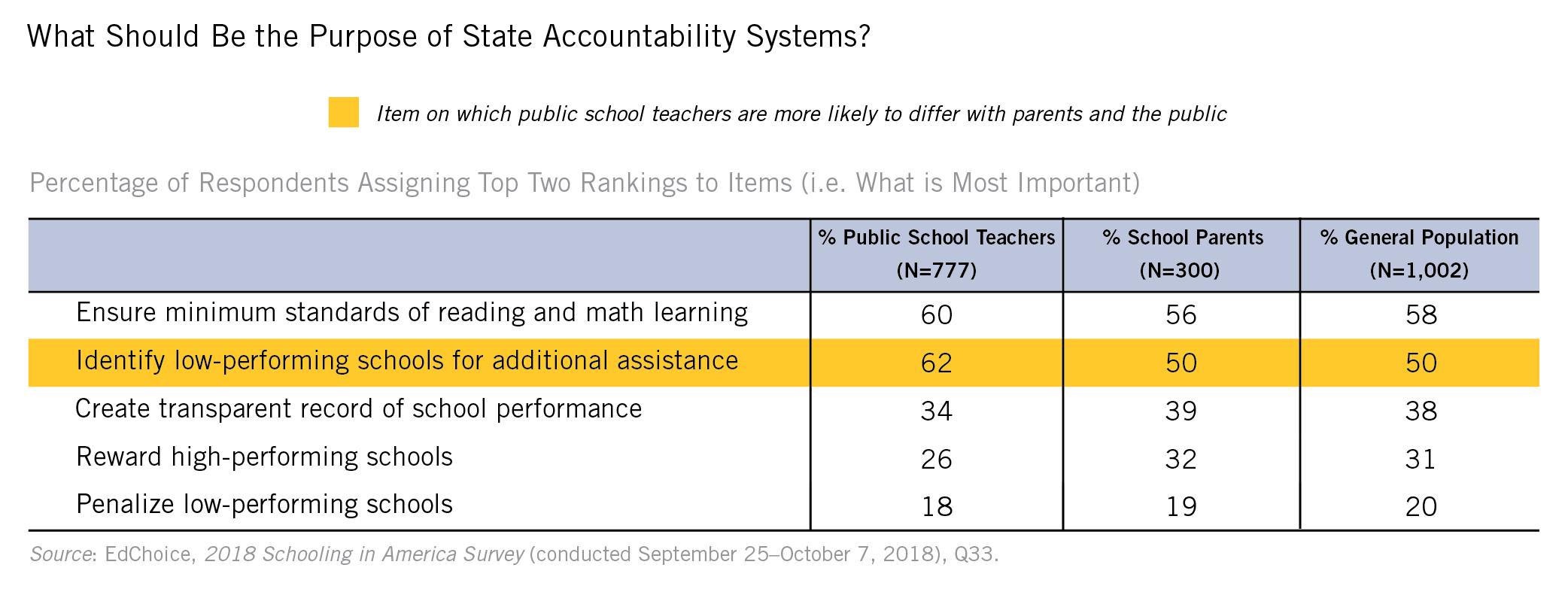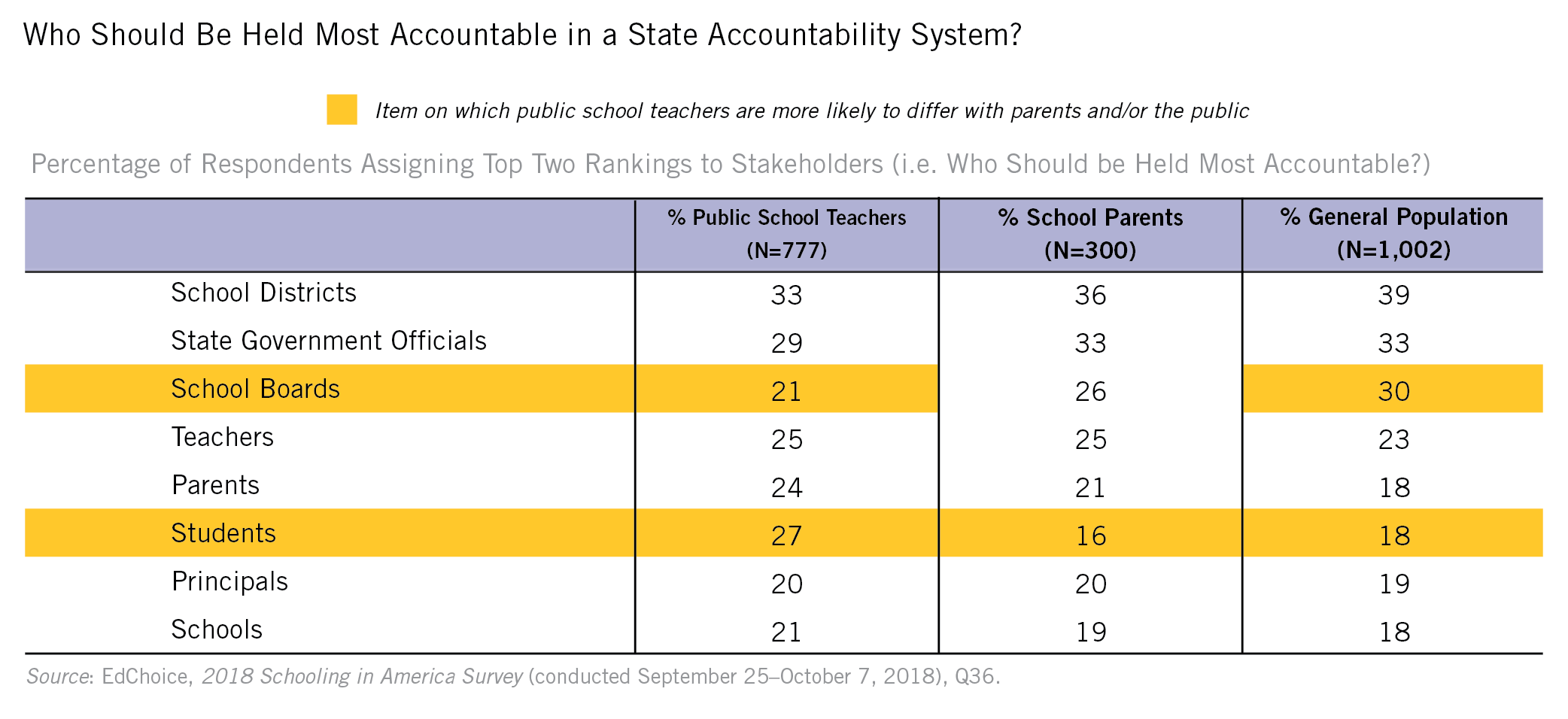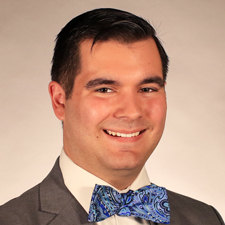Schooling in America Series: Teachers’ Views on Accountability and School Choice
Last fall, a Florida public school teacher went viral when she released a letter decrying the state of her district’s accountability system and the view of students in the K–12 education machine.
“Children are not data points,” Hicks wrote. “Teachers are not cattle herders. Yet, the district maintains an incessant and desperate need to pigeon hole education and goat herd bewildered students through an algorithm of disappointment and forced uniformity.”
Hicks’s view isn’t uncommon among teachers, our 2018 Schooling in America Survey found. Teachers tended not to be satisfied with their jobs, and they trusted parents less than students and principals. They also had some unexpected views on school choice and teacher-led accountability systems.
In this series, we’re incorporating other surveys, as well as events that have made news in the past year, to add context to our 2018 Schooling in America Survey. Today, we’re taking a closer look at teachers’ views of school choice and education accountability.
How Teachers View School Choice Policies
When provided with a definition of tax-credit scholarships, current public school teachers were twice as likely to favor such school choice policies than oppose them (67 percent vs. 32 percent). Nearly six out of 10 (57 percent) favor charter schools; however, only 15 percent “strongly favor” charter schools, as opposed to 42 percent “somewhat” favoring.
More than half (54 percent) support school vouchers, compared to 46 percent who oppose them. Mid-career teachers who have taught between four and nine years were significantly more likely (67 percent) to favor vouchers than those who have been teaching for 10 or more years (44 percent).
A large portion of this support for vouchers might be attributed to the “don’t know” responses disappearing from the 17 percent we observed for the non-descriptive question. Similarly, more than one-fourth (26 percent) of current public school teachers originally responded “don’t know” when asked a non-descriptive question about education savings accounts (ESAs). This is perhaps due to their lack of prevalence—only six states currently have ESAs, and they are largely limited to students with special needs.
When provided with a definition of ESAs, though, nearly eight out of 10 educators (78 percent) said they support them. This was far and away the most support of any school choice policy. In fact, current public school teachers were significantly more likely to support ESAs than the general public (74 percent). Furthermore, more than three-fourths of teachers favored ESAs regardless of how long they have been teaching, which grade levels they taught or their community type (urban, suburban, and small town/rural). Among public school teachers who support ESAs, 30 percent said it’s because they provide “more freedom and flexibility for parents”—the top reason given.
A January 2019 USA Today/Ipsos poll, while not explicitly polling teachers on school choice, did ask teachers about charter and private schools. Nearly half (47 percent) of teachers said that private and charter schools usually provide a better education than private schools, which was slightly more than who disagreed (46 percent).
How Teachers View Accountability
Current public school teachers were more likely to say identifying low-performing schools for additional assistance (62 percent) should be the purpose of an education accountability system than both current school parents and the general public.

Perhaps not surprisingly, teachers thought teachers themselves should have the most say in developing a state education accountability system (66 percent). A third (32 percent) thought parents should have the most or second-most say in such a system.
Teachers were more split, though, on who should be held most accountable in an education accountability system. Teachers were more likely than the general public to say students (27 percent) and school boards (21 percent), but at least a fifth identified eight sets of educations stakeholders as those who should be the most or second-most accountable.
USA Today/Ipsos found nearly a third of teachers (31 percent) spend 15 or more hours a week on non-grading paperwork. While such paperwork is often the result of education accountability systems, six in 10 teachers (62 percent) agreed with the statement that “charter schools require more oversight and regulation.”

—
Teachers’ views on school choice and education accountability are undoubtedly affected by their experiences in the classroom. While they aren’t physically located in front of the chalkboard, parents also have an up-close seat to education policies affect future generations. Next time on the Schooling in America Series, we’ll look at how parents view school choice and accountability.
Other Posts in the Schooling in America Series
Schooling in America Series: Getting to Know Our Teachers
Schooling in America Series: Getting to Know School Parents
Schooling in America Series: Getting to Know the Public on Public Education
Schooling in America Series: K-12 Education Funding
Schooling in America Series: The Public on School Choice
Schooling in America Series: The Public on K–12 Accountability




